Meredith Whitney is back after nearly ten years of hiding from the public eye.
Most of you probably don't know or even remember Whitney.
She became one the financial media's so-called experts after making a basic prediction in October 2007 that Citigroup would need to cut its dividend.
Her reasoning was based on the notion that the bank's profits would not be able to cover the dividend.
Given that she was referring to the common stock, it's important to note that dividend cuts are quite common and do not necessarily point to deep issues within the firm.
At the time Whitney was working as a banking analyst for Oppenheimer.
From this very basic prediction by Whitney, the media later credited her as having predicted the collapse of the banks during the 2008 financial crisis.
This is a false claim.
It's the kind of dishonesty we've come to expect from the financial media.
Yet, many people naively went along with this ridiculous claim because they trusted the media.
The media also falsely claims Peter Schiff, Nouriel Roubini, Jim Rickards, Robert Kiyosaki, John Paulson, Michael Burry, Kyle Bass, Raoul Pal, and many others (most of which are charlatans and broken clocks) predicted the 2008 financial crisis.
Not a single one of these individuals predicted the 2008 financial crisis. And that is a fact.
Let me show you how one would demonstrate having predicted the 2008 Financial Crisis. Check these links here, here, here, here, here, here, here, here, here, here, here, and here.
A year after the 2008 financial crisis, Whitney took advantage of her media fame to start her own research firm in early 2009 called Meredith Whitney LLC. She had big plans to cash in on her new media fame, including expanding into an investment banking firm and credit rating agency.
By fall 2009, several months after the stock market had bottomed, Whitney was still preaching doom.
In the video below she claims that house prices would collapse by another 25%, making the total price decline, from peak to trough 50%.
You should note that Mike Stathis predicted the peak to trough house price decline in the U.S. on average by 35% in his 2006 book, America's Financial Apocalypse. See here.
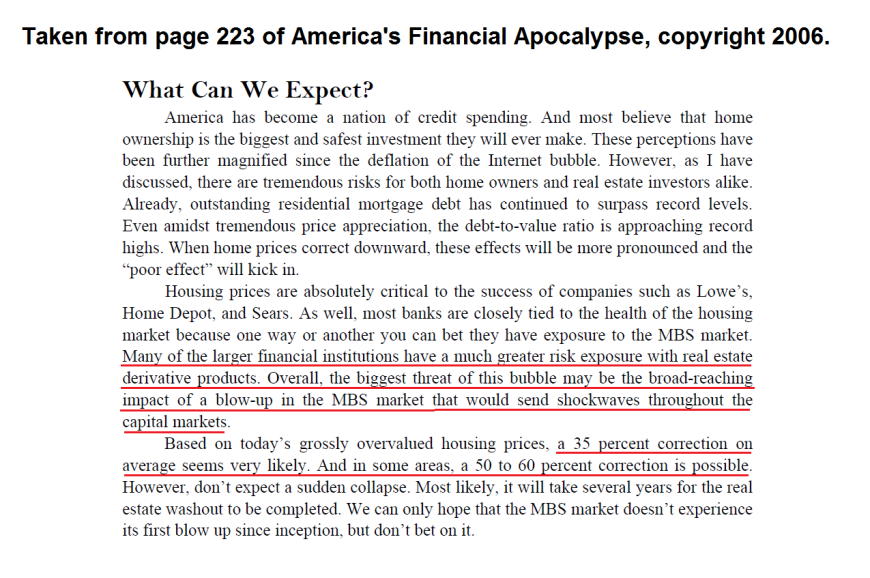
At the bottom of the housing market in 2011, the peak to trough decline in U.S. house prices came in at 35%.
Mike Stathis was right again.
And he made this amazing prediction even before the 2008 financial crisis appeared.
No one else, not even Nobel Prize economist, Robert Shiller (who publishes the Case-Shiller housing index) made this prediction.
Although Whitney had the advantage of being in the spotlight during a period when doom was a reality, she was unable predict the bottom in housing prices after the financial crisis.
By fall 2010, Whitney leveraged her media fame again claiming that by the end of 2011, between 50 to 100 major bond defaults would occur in the U.S. amounting to hundreds of billions of dollars in losses.
Here's a critical point worth mention.
Mike Stathis wrote about the high chance of several municipal defaults in 2008 before the financial crisis. But his predictions were focused mainly on historically vulnerable cities like Cleveland, Detroit and a few others.
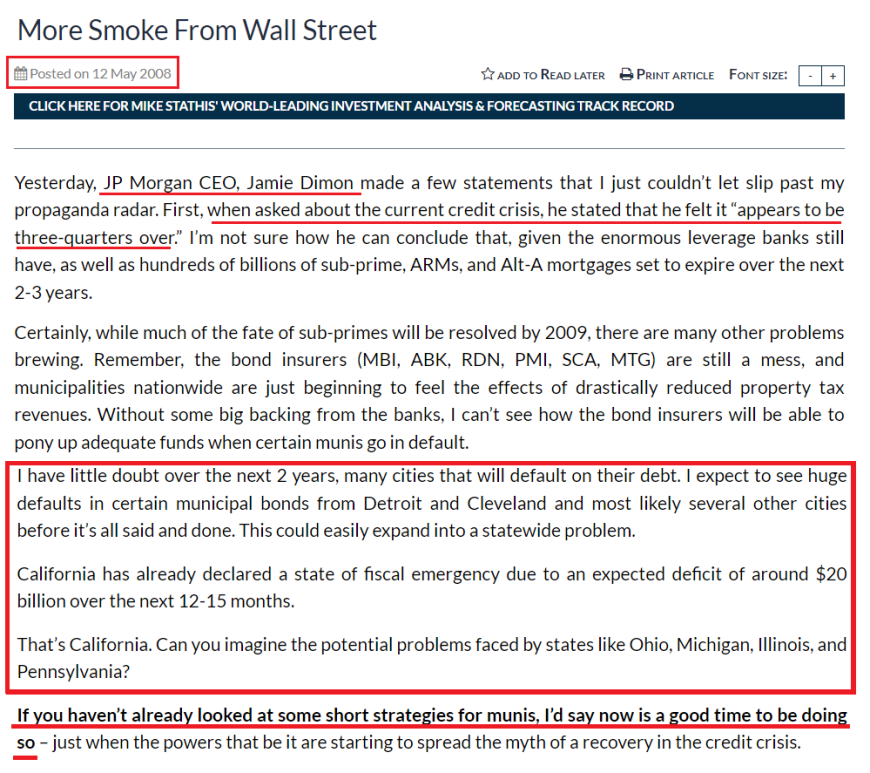
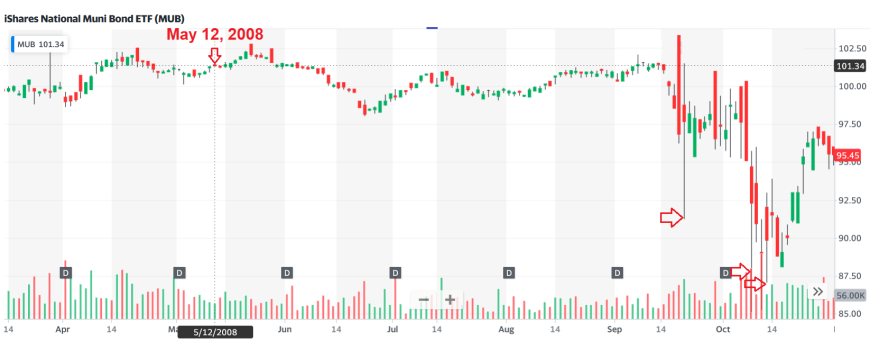
In contrast, Whitney only came out with her muni default predictions TWO YEARS AFTER the financial crisis.
Remember that it's much easier to make dire predictions after a catastrophe has struck.
Often, these so-called experts in the media simply ride the current trend when making their predictions, so they're credited for having predicted what was already likely.
These people are really broadcasters rather than forecasters.
So although Whitney made her predictions during a period when an economic catastrophe had already struck, her predictions were just outrageous.
Why were Stathis' predictions much more modest?
Because Stathis was being realistic.
Stathis is arguably the only person in the world who truly predicted the 2008 financial crisis. See here, here, here, here, here, here, here, here, here, here, here, and here.
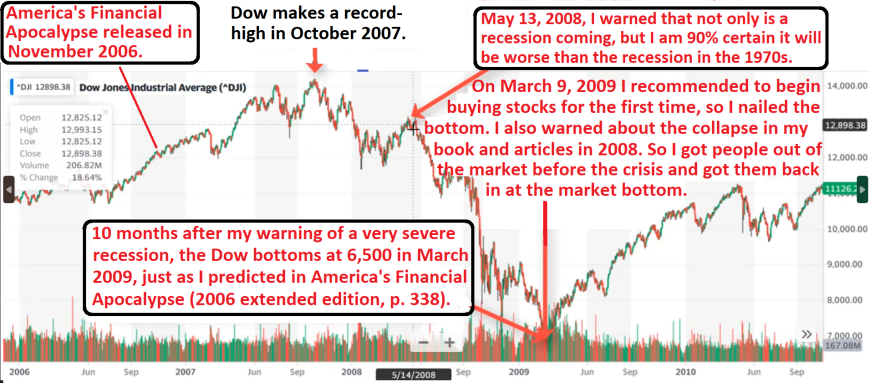
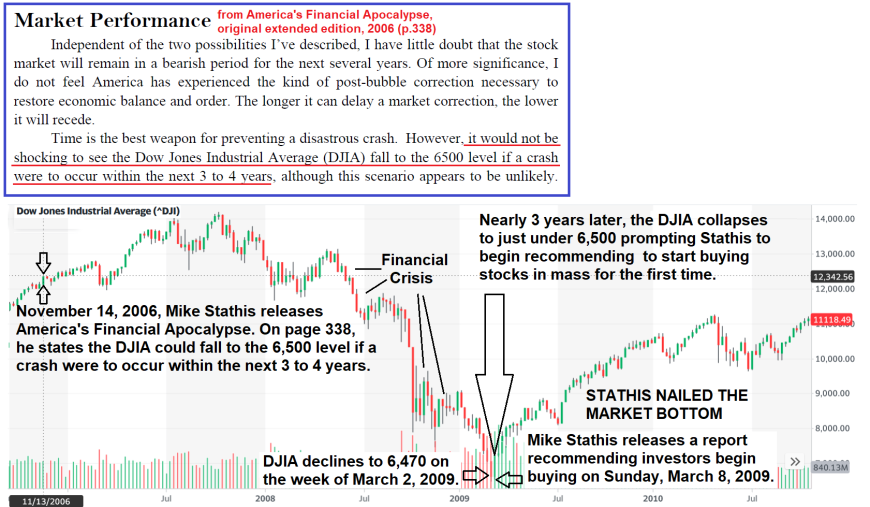
The following passage is an excerpt from the 2006 original extended edition of America's Financial Apocalypse, chapter 10. See here for the full chapter.
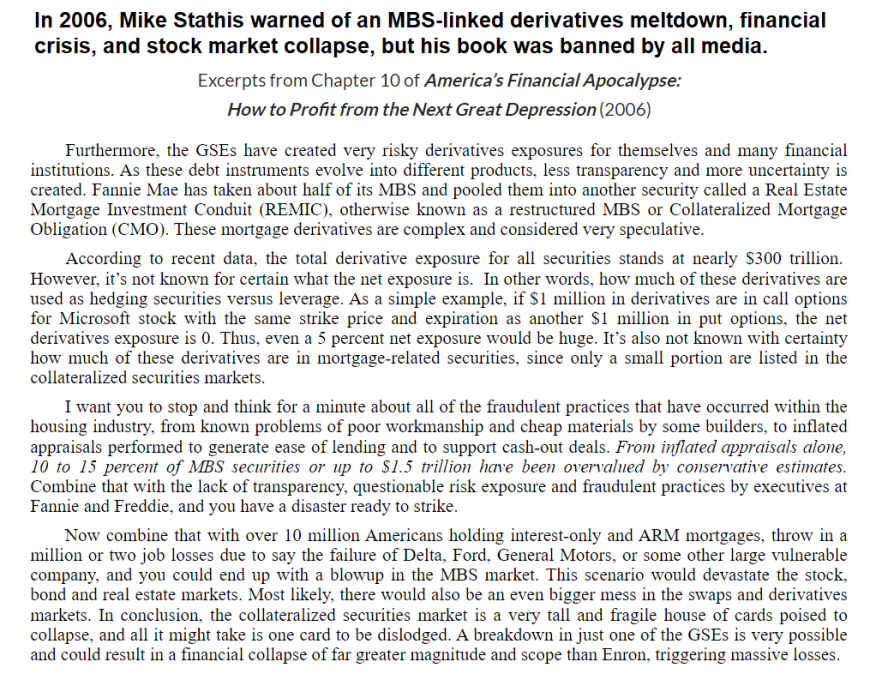
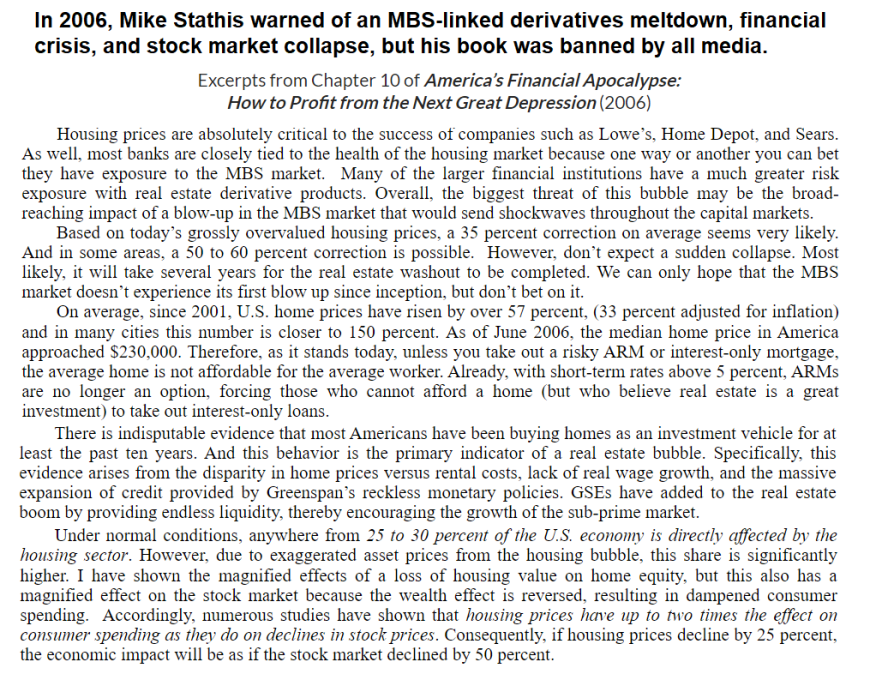
In contrast, Whitney was way behind the curve.
She failed to predict the financial crisis. So she was creating excessive hype and fear in order to generate exposure for herself so people would pay for her (useless and overpriced) research.
More important and to emphasize again, Mike Stathis' municipal default predictions were made BEFORE the 2008 financial crisis and were based on his unique understanding of the crisis.
That makes him a credible investment analyst and FORECASTER.
In contrast, Whitney's predictions came two years after the financial crisis and only AFTER several municipalities were already in trouble.
That makes her a useless BROADCASTER.
But she completely screwed up by making outrageous predictions.
She screwed everything up for a good reason. Whitney was completely clueless.
Remember, Whitney did not predict the financial crisis.
Moreover, she had no idea it was coming.
How do we know?
First and foremost, there's no evidence showing that she predicted the financial crisis.
Stating that Citigroup would need to cut its dividend is hardly evidence of even a major problem from within Citigroup, much less an entire banking crisis.
Second, Whitney actually lost a small fortune riding an investment in Lehman Brothers all the way down to 0. See here.
If Whitney predicted the financial crisis, why did she invest in Lehman Brothers?
And why did she ride the stock all the way down to 0?
I'm willing to bet Whitney got the idea about her municipal bond default predictions after having read Mike Stathis' pre-financial crisis books and articles. In this scenario, she would have needed to add extreme hyperbole to the picture so as to stand out and get noticed by the media. See here, here, here, here, here, here, here, here, here, here, here, and here.
Characters like Whitney are usually too lazy and more often too incompetent to come up with uniquely valuable research. Instead of producing accurate and timely research, these types of people often run with something they read from the media.
Given that many cities were already in trouble by the time Whitney came out with her municipal bond default report in fall 2010, there's also a good chance she took what she read from various media reports and extrapolated the numbers to ridiculous levels in order to stand out from the crowd.
For example, here's an article from CNN Money published in May 2010 (before Whitney's report was published) discussing the chance of municipal defaults.
Because CNN Money does not publish articles based on original research, you can bet the article was created after compiling numerous sources from CNBC, Bloomberg, etc.
The point is that by the time 2010 came, the possibility of several municipal bond defaults was already being discussed among analysts and investors.
Even CNN Money was publishing articles about the situation.
That means it was pretty well known by then.
Therefore, by 2010 Mike Stathis' expectations for municipal defaults (which were published in May 2008 before the financial crisis) had already become a reality, rendering Whitney late to the party.
Thus, in order to attract enough attention for the kind of media exposure she needed to bring in customers, she may have felt the need to make wild claims about municipal bond defaults.
We believe this is why she adapted her premise that up to "100 major muni bonds would default, amounting to hundreds of billions of dollars within the next twelve months" when she appeared on 60 Minutes in December 2010.
So even though Whitney came out with her municipal default predictions after problems had already materialized, her predictions were still a total FAIL because she was much too extreme.
Interestingly, at the time she made these predictions, Whitney had also applied to securities regulators to launch her own credit rating agency. See here and here.
Because the media created the false perception that Whitney predicted the 2008 financial crisis, she thought she would be able to sell her research starting at $100,000.
And she was going to need to sell loads of subscriptions in order to pay the bills for her credit rating firm.
But this would not come to pass. See here.
Instead of scaring institutions into buying her overpriced dubious research, they shunned her.
Whitney's firm would shut down just a couple of years later, but not before leveraging her media celebrity again by launching a hedge fund called Kenbelle Capital LP. See here
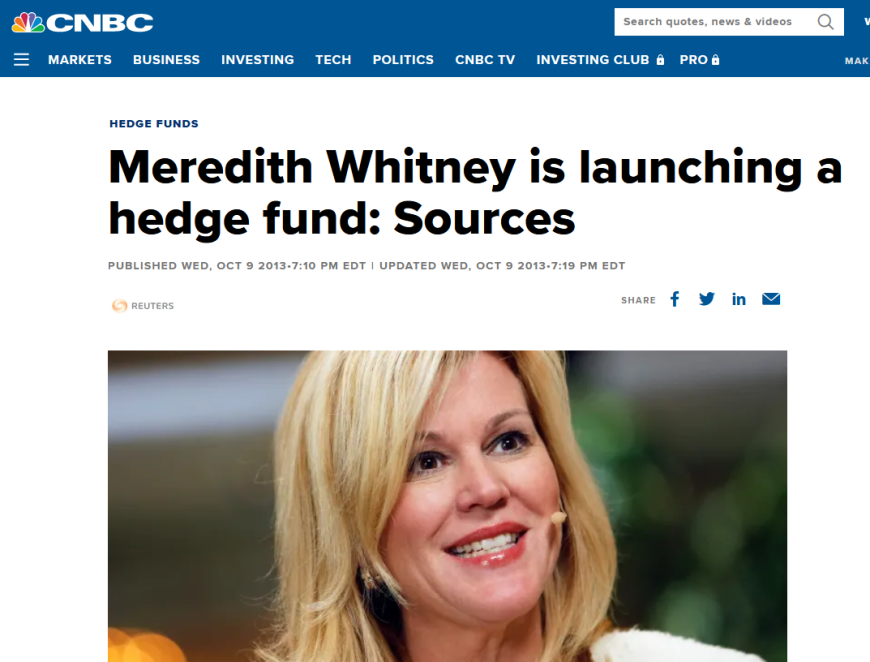
By now you can guess how that turned out. See here, here, here, here, and here.
Whitney's hedge fund suffered a fate similar to her brokerage firm, Meredith Whitney Securities LLC brokerage, which shuttered on August 28, 2013 (based filings from the Financial Industry Regulatory Authority).
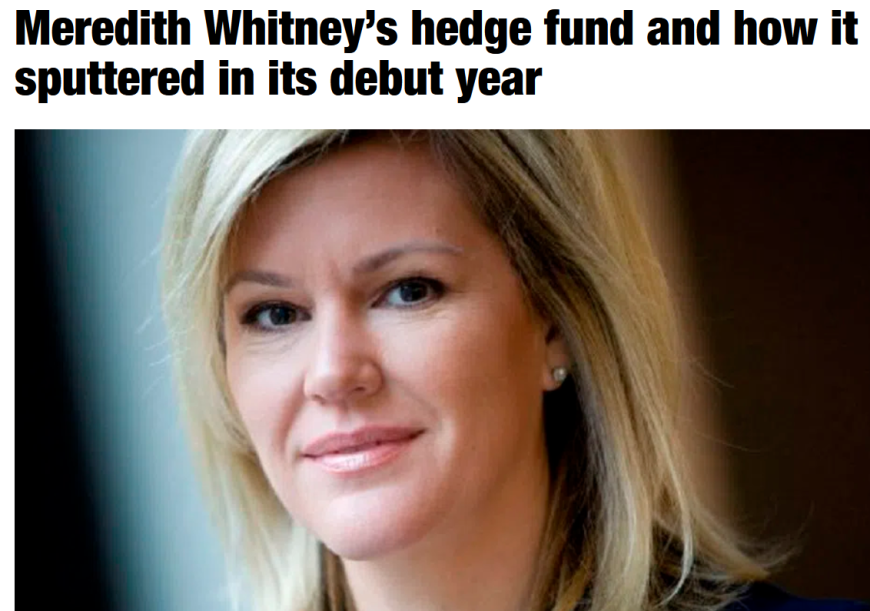
You might want to watch the following video (below) published in 2013 where Mike exposes the reality about Meredith Whitney.
Marketing Disguised as News: Meredith Whitney and Peter Schiff Exposed
You should also check the following articles from 2011 to give you more background on Whitney.
Deconstructing Meredith Whitney's Default Predictions
Mike Stathis Exposes Meredith Whitney (Yes, Again!)
The final video below is a recent commentary by Mike.
Be warned.
The video lasts just over two hours. But I'm sure you'll agree it's worth your time, especially considering that this unique education you're going to get is free.
In this video Mike highlights how Whitney came out from hiding after her horrendous muni prediction.
Moreover, he explains how Whitney and Barron's are misleading the public by making false claims about her track record. Doing so enriches both her and Barron's, so this amounts to fraud.
Finally, Mike emphasizes that this type of deception is a common tactic used by the media to create false perceptions about its so-called "experts" in order to mislead the public and create dumb money.
Restrictions Against Reproduction: No part of this publication may be reproduced, stored in a retrieval system, or transmitted in any form or by any means, electronic, mechanical, photocopying, recording, scanning, or otherwise, except as permitted under Section 107 or 108 of the 1976 United States Copyright Act, without the prior written permission of the copyright owner and the Publisher.
These articles and commentaries cannot be reposted or used in any publications for which there is any revenue generated directly or indirectly. These articles cannot be used to enhance the viewer appeal of any website, including any ad revenue on the website, other than those sites for which specific written permission has been granted. Any such violations are unlawful and violators will be prosecuted in accordance with these laws.
Article 19 of the United Nations' Universal Declaration of Human Rights: Everyone has the right to freedom of opinion and expression; this right includes freedom to hold opinions without interference and to seek, receive and impart information and ideas through any media and regardless of frontiers.
This publication (written, audio and video) represents the commentary and/or criticisms from Mike Stathis or other individuals affiliated with Mike Stathis or AVA Investment Analytics (referred to hereafter as the “author”). Therefore, the commentary and/or criticisms only serve as an opinion and therefore should not be taken to be factual representations, regardless of what might be stated in these commentaries/criticisms. There is always a possibility that the author has made one or more unintentional errors, misspoke, misinterpreted information, and/or excluded information which might have altered the commentary and/or criticisms. Hence, you are advised to conduct your own independent investigations so that you can form your own conclusions. We encourage the public to contact us if we have made any errors in statements or assumptions. We also encourage the public to contact us if we have left out relevant information which might alter our conclusions. We cannot promise a response, but we will consider all valid information.